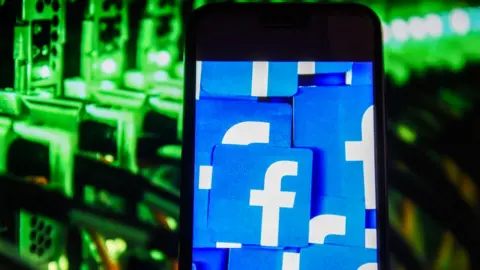Key fact-checkers stop working with Facebook
 Getty Images
Getty ImagesTwo leading fact-checking agencies have stopped their work with Facebook, striking a blow to the network's efforts to fight fake news.
The social network had paid the Associated Press and Snopes to combat its misinformation crisis.
But both firms confirmed they are no longer checking articles. The AP told the BBC it was in "ongoing conversations" about work in future.
Facebook said it was committed to fighting fake news.
The company said it would expand its efforts in 2019.
"Fighting misinformation takes a multi-pronged approach from across the industry," a Facebook spokeswoman told the BBC.
"We are committed to fighting this through many tactics, and the work that third-party fact-checkers do is a valued and important piece of this effort.
"We have strong relationships with 34 fact-checking partners around the world who fact-check content in 16 languages, and we plan to expand the programme this year by adding new partners and languages."
'Open dialogue'
A spokeswoman for the AP told the BBC: "AP constantly evaluates how to best deploy its fact-checking resources, and that includes ongoing conversations with Facebook about opportunities to do important fact-checking work on its platform."
Snopes said it needed to "determine with certainty that our efforts to aid any particular platform are a net positive for our online community, publication and staff”.
The site's founder David Mikkelson, and head of operations Vinny Green, said in a blog post that the firm did not rule out working with Facebook in future.
"We hope to keep an open dialogue going with Facebook to discuss approaches to combating misinformation that are beneficial to platforms, fact-checking organisations and the user community alike," the company said.
The blog post acknowledged that choosing not to renew its work with Facebook would have financial repercussions for the company.
In 2017, Facebook paid Snopes $100,000 (£76,500) for its work. Snopes has not yet released its financial disclosures for 2018.
"Forgoing an economic opportunity is not a decision that we or any other journalistic enterprise can take lightly in the current publishing landscape," the company said.
'Mishandled'
Late last year, the Guardian published a report that suggested fact-checking firms were frustrated by Facebook’s lack of transparency.
The article quoted former Snopes managing editor Brooke Binkowski as saying: “They’ve essentially used us for crisis PR. They’re not taking anything seriously. They are more interested in making themselves look good and passing the buck… They clearly don’t care.”
In a blog post, Facebook disputed the Guardian's report, saying it had "several inaccuracies".
Speaking about the news Snopes and the AP had pulled out, Ms Binkowski said she felt Facebook was too controlling over the fact-checking companies.
"Facebook can't handle any kind of pushback, any kind of public criticism," she told the BBC, adding that she felt the fact-checking programme at Facebook had been "mishandled".
Facebook has worked with two other fact-checking agencies in the US. One, Politifact, told the BBC it intended to continue working with Facebook in 2019. The other, Factcheck.org, did not respond to requests for comment at the time of publication.

Follow Dave Lee on Twitter @DaveLeeBBC
Do you have more information about this or any other technology story? You can reach Dave directly and securely through encrypted messaging app Signal on: +1 (628) 400-7370
